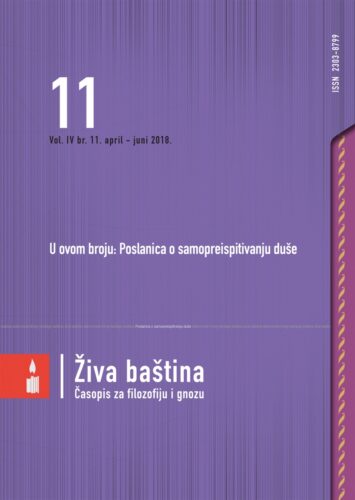UDK 1 Ibn Arebi
141.336 : 28-23]
Većina komentatora Kur’ana smatra da je Faraon osuđen na Džehennem, dočim u sufijskim krugovima ova uobičajena interpretacija nije uvijek bila prihvaćena. Ibn Arebijeva teza o ispravnosti Faraonovog potvrđivanja vjere, koja zauzima samo nekoliko stranica u Fususu al-Hikamu, privukla je jako veliki broj komentara i od njegovih pobornika i od kritičara. U odbranu Ibn Arebijevog gledišta možda je najprikladniji primjer kratka rasprava o Faraonovoj vjeri koju je napisao al-Dawwānī. Ovo djelo je pokušao opovrgnuti u jednom detaljnom komentaru pravnik iz 16. stoljeća ‘Alī al-Qārī. U ovome tekstu su ukratko prikazani stavovi obojice po ovom pitanju, a prije toga gledišta samog Ibn Arebija. Na kraju vidimo koliko se ovo pitanje tiče sufijskog tumačenja Kur’ana, jer je ovdje osnovno pitanje, mada nije neposredno navedeno, pitanje tekstualne egzegeze. Prema autoru, Faraonova vjera se zapravo mora razumjeti u kontekstu Fususa, gdje okončava zapanjujuće tumačenje Musaa i Faraona kao manifestacijâ polarne napetosti u Božanskom Biću. Vjera Faraona je samo jedan aspekt Ibn Arebijevog razumijevanja Teksta, koji je smatrao da božanska milost ne(će) trpi(ti) ograničenje. Odstupanje ove sufijske interpretacije od standardnog konsenzusa predstavlja trajnu napetost unutar svake religijske tradicije.
CONTROVERSIES OVER IBN ‘ARABI'S FUSUS: THE FAITH OF PHARAOH
Abstract
The majority of commentators of Qur'an hold that Pharaoh was doomed to Jahannam, whereas such interpretation was not always accepted in Sufi circles. Ibn ‘Arabi's thesis of the validity of Pharoh's confession of faith, which occupies only a couple of pages in the Fusus al-Hikam, has attracted a remarkable amount of comment from both his supporters and detractors. To support Ibn ‘Arabi's view, perhaps the most convenient example is a brief treatise on the faith of Pharaoh written by al-Dawwānī. A jurist from the 16th century, ‘Alī al-Qārī, attempted to refute this work in a detailed commentary. This text briefly presents arguments of both authors about this issue, as well as the view of Ibn ‘Arabi himself. Finally, it becomes clear how this issue is related to the issue of Sufi interpretation of Qur'an, since the underlying issue, though not stated directly, is that of Scriptural exegesis. According to the author, the faith of Pharaoh actually must be understood in the context of the Fusus, where it concludes the startling interpretation of Moses and Pharaoh as manifestations of polar tensions in the Divine Being. The faith of Pharaoh is merely one aspect of Ibn ‘Arabi's reading of the Scripture, who thought that the divine mercy would suffer no limitations. The variance of this Sufi interpretation from the standard consensus constitutes a perennial tension within each religious tradition.
Keywords: Ibn ‘Arabi, Fususu al-Hikam, the Pharoh's faith, al-Dawwānī, ‘Alī al-Qārī, the Sufi interpretation of Qur’an.
[tags]

